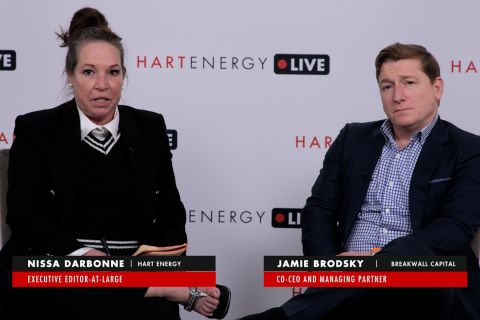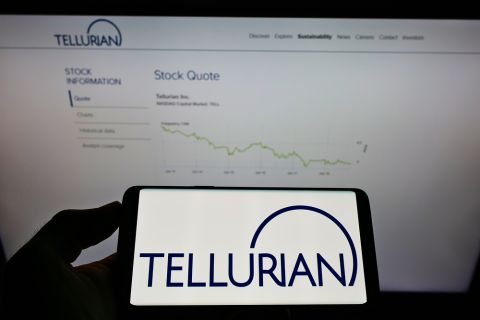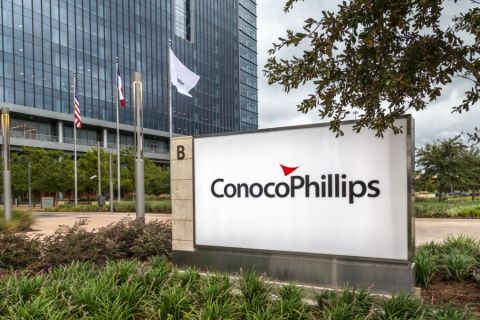Presented by:

Ricky Ehrgott dreamed of being a race car driver. Unlike many young boys with the same dream, he had the talent to make it to the track before a nasty accident derailed his career. But that wasn’t the end of his dreams.
Fueled by a desire to succeed and an experience from his father’s start-up, Rev1 Energy, Erghott moved from the track to the c-suite where he now serves as CEO of the project management software company that began in his boyhood home.
Rev1 is a 20-year-old company that sped up its success over the last five years through new software. Like any good race car driver, Erghott and team have pushed forward through a crowded field and around sharp curves in the energy business.
Ehrgott recently talked to Hart Energy’s editorial director Len Vermillion about the journey from budding NASCAR driver to up-and-coming CEO.
Len Vermillion: How does a former NASCAR driver end up creating software for oil and gas?
Ricky Ehrgott: My dad owned Indy cars so when I was in fifth grade and I was going to the Indianapolis 500, and it was just something that really caught my attention, it's something I've always wanted to do.
I started racing when I was around 14 or 15-years-old and raced open-wheeled cars, and then raced into trying to do Indy cars but then had an accident and tore an artery in my neck.
LV: Whoa.

RE: Yeah, set me back quite a bit, I was out for two or three years. So, you can imagine, if anytime you have the upward momentum in sports, if you get that momentum taken away, it's pretty challenging to get that back. I did some races in ARCA [Menards Series]. I did some races in NASCAR, but never could quite get to the professional level.
LV: You had a place to go from there since you had experience with Rev1 Energy. Tell us a little about Rev1, what does the software do?
RE: Rev1 Energy is a commissioning services organization that I run. and we really focus on helping projects run smoother by providing really successful teams and philosophies to the project. So, throughout our energy experience, we've worked on a lot of different projects, a lot of different assets around the world and we bring that knowledge to every project.
We work on everything from solar projects to wind turbines, to power plants, offshore platforms, refineries, basically anything in the energy spectrum, that's what we can work on.
LV: What kind of interesting projects you've been involved with?
RE: One of the interesting projects I think in recent times is we've been kind of brought in on some of these newer renewable natural gas projects. And it's pretty exciting to see the legacy companies, I won't be able to name any names, but the legacy companies that are involved, they're very large, very well-known companies and have started to pivot into these different areas and they see an opportunity to capitalize on investing in these projects.
What they're doing is basically capturing methane from these cattle farms and converting it into renewable natural gas. So, it's an exciting time to be a part of these projects. I always say here at Rev1 that we're pretty much project agnostic. We don't care what the project is or where it's coming from or where it is in the world, we just like to be a part of it. So, that's probably one of the coolest things we've been involved in recent times.
LV: You've obviously had a lot of underground experience in oil and gas, which led to the development of the company. Back in 2001, I don't know that many were thinking about digitalizing oil and gas. The internet was still fairly in its infancy at that point. How did you guys get so far ahead of the game?
RE: My dad was always really good at seeing the trends coming down the line and he may have been early in a lot of different ways. I think the digitalization trend he saw coming, and I think he saw that staying. It was something that was going to stay for a long time. And in 2001, so he had a company prior to 2001 called Penpower, which he sold to general electric in 1998.
With Rev1, the idea was I want to take what I did at Pin Power and then make this one even better and then incorporate a lot of things that he wanted to do at Pin Power into Rev1. So, one of them being digitalization. We were always on the periphery from 2001 to around 2008.
We wanted to get involved. We weren't really sure how, and we partnered with one of our, actually our lead developer now, he's involved with our software tracker technologies. That's the software company that we sell the software through. He was the one that originally developed Tracker Check, which is a legacy software.
It started in 2008 on a project, he was working as a turnover coordinator and he had used a lot of these other kinds of software, but it was one of those things where the necessity is mother of all invention. We thought if we could take what's really good and combine it into one software, then we can really have a lot of the market. So, we utilized the software just in internal projects. We did that up until 2016 and then decided we wanted to really make the investment and take that software public. We felt like it was in a good position to do so. And really haven't looked back since, so 2016 was really when we started marketing it to the wider industry and it's been pretty successful.
LV: While Rev1 isn't necessarily a new company, although 20 years old isn't exactly, the software is very new. So, how has it been received?
RE: Obviously, I'm biased, but everybody we talk to, it does seem that they really have a genuine appreciation for how easy the software is to use. What we're trying to do is take the approach that we're not really a software company, we do build software but we're practitioners in the field. We go do these jobs every day. So, we're more of a partner to these organizations as opposed to, "Hey, here's the software, this is how you use it, now go use it. We're going to charge you every month for it."
It's more, well, here's the software, but here are the philosophies to go around the software and we can basically package all this up into one large scope of work and provide all that support to a client or an EPC or an oil major, whoever it would be. So, it's a bit different than just a traditional software organization where they build the software in an office, they sell the software and the support is there, but it's not really boots on the ground support.
LV: When exactly did you leave NASCAR and start running Rev1?
RE: It was around 2014. I got out of racing in 2013. I made the decision, should I be a struggling race car driver the rest of my life or should I make the decision to go into business and maybe someday own a race team? So, that's really when I made the decision to transition over to the energy space and it was a good time because my dad was at the point where he was wanting to take a step back and not want to work as much. So, it worked out really well.
LV: Are you guys still owners of cars?
RE: We are not. One of our shareholders actually sponsors an Xfinity [Series]car, Justin Allgaier's car. So, we're still very much involved and still very much appreciate the racing aspect and the alignment that Rev1 Energy and racing has. I think we really do appreciate that. It's just that we haven't gotten back into it yet.
LV: Where does Rev1 go from here? What’s the future plan?
RE: We have started out pretty humbly. My dad started Rev1 in the front office of our house. So, even though I wasn't an employee of Rev1, I was still very much involved in all that. I always tell the story about the engineers that would come to the house for interviews and things like that. I would be doing my math, eighth-grade math problems, which were not that complicated, but the engineers would come in and it would turn it into a three or four-hour-long math problem that was five- or six-pages long. I would take it to the teacher the next day and they would shake their head and say that there's no reason that this needed to be that complicated.
So, it's kind of a funny story that at a young age, I was exposed to that kind of experience, but we've come from that to, we have 10 offices globally around the world.
We have the software division. We have the oil and gas division, the power division. So, we've really expanded a lot. I think even people that have seen Rev1 in the last five, six years would be drastically surprised at the difference that they would see in the company today.
LV: So, let me ask you then about digitalization in general. It's come a long way obviously since 2001, probably even since 2016, so where do you see that going?
RE: I think digitalization is something that you have to have just to stay competitive. It's not an edge anymore. So, if you have digitalization in your organization, you're not getting an edge on anybody, you're just staying competitive in the market. I think companies that don't adopt streamlined digitalization process are going to fall all by the wayside in the next five to seven years.
Given the last two years of basically all remote work, obviously, the work has to be done on site still tool in hand, but the digitalization side, there's a lot of things you can do, like in terms of our software, there's an individual that could sit in the UK and manage projects in the U.S. and Asia and the Middle East, all at the same time. So that previously was a lot harder to do because you need to have basically one person in every location to manage the software or the process that the software replaces. So, I see that happening more and more and as the digitalization journey for each company takes hold and you see that they get more mature on the digitalization journey.
Recommended Reading
US Energy Secretary Nominee Chris Wright Champions Energy at DUG GAS
2024-11-19 - President-elect Donald Trump's energy secretary nominee Chris Wright championed energy's role in bettering human lives earlier this year on stage at Hart Energy’s DUG GAS Conference and Expo.
No Shortage of Capital, Shortage of Investable Low-carbon Projects
2024-09-30 - Investors are looking to the bankability equation—sustainability plus guaranteed returns—and finding that the energy transition’s problem is not a shortage of capital, but a shortage of investable projects.
CEO: Breakwall Providing Capital as RBLs ‘Materially’ Decrease
2024-10-09 - Breakwall Capital is stepping in to bridge the gap from the historic days of reserve-based lending, Breakwall Managing Partner and co-CEO Jamie Brodsky said at Hart Energy's Energy Capital Conference in Dallas.
Souki’s Saga: How Tellurian Escaped Ruin with ‘The Pause,’ $1.2B Exit
2024-09-11 - President Biden’s LNG pause in January suddenly made Tellurian Inc.’s LNG export permit more valuable. The company’s July sale marked the end of an eight-year saga—particularly the last 16 months, starting with when its co-founder lost his stock, ranch and yacht in a foreclosure.
ConocoPhillips Adds Connors to Board
2024-09-05 - Nelda J. Connors will serve on the audit and finance committee and public policy and sustainability committee of ConocoPhillips’ board.
Comments
Add new comment
This conversation is moderated according to Hart Energy community rules. Please read the rules before joining the discussion. If you’re experiencing any technical problems, please contact our customer care team.





